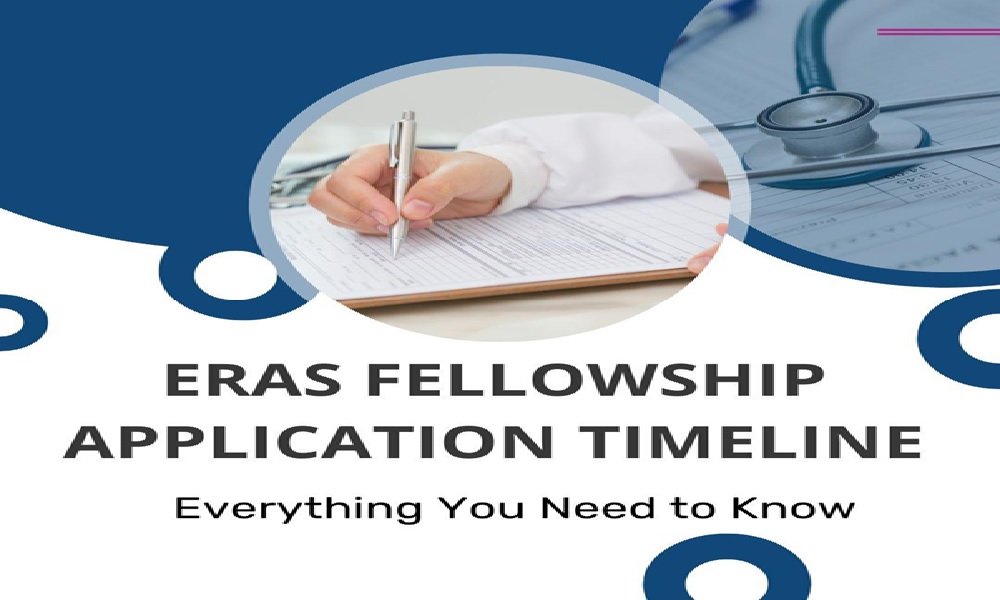
Introduction
The ERAS Fellowship Application Timeline is a crucial guide for medical professionals pursuing specialized training in their chosen fields, whether as surgeons, psychiatrists, or in any other subspecialty. Understanding this timeline is essential for a successful application. It walks you through necessary steps, deadlines, and key milestones, ensuring preparation and organization throughout the application journey. Let’s navigate this timeline together, providing you with everything you need to embark on your fellowship application journey with confidence. This process is pivotal for medical professionals seeking to advance their careers in specialized fields, requiring mastery of timing and organization. In this comprehensive guide, we’ll explore key dates, deadlines, and strategies to optimize your path towards securing a coveted fellowship position.
Application Opening and Deadline
The ERAS Fellowship application cycle typically commences in July each year. It’s crucial for prospective applicants to mark their calendars and be ready to kickstart the process as soon as the gates open. The application deadline, often around late summer or early fall, should be etched in your memory and adhered to with unwavering commitment.
Missing the application deadline can have far-reaching consequences, potentially sidelining an otherwise stellar candidate. Program directors value punctuality and adherence to deadlines, viewing them as indicators of professionalism and commitment. To avoid jeopardizing your chances, it’s imperative to submit your application within the specified timeframe.
Important Dates for Fellowship Applicants
The important dates for fellowship applicants in 2023 may vary depending on the specific fellowship program. It is recommended to check the official website of the fellowship program for the most up-to-date information on application deadlines, interview dates, and notification of acceptance. A successful ERAS Fellowship application hinges on meticulous attention to important dates throughout the application cycle.
Application Submission

As previously mentioned, the application typically opens in July. However, early submission, within the first few weeks, is advisable to secure a competitive advantage.
Interview Offers
Following the submission of your application, you can expect interview invitations to start trickling in as early as late summer and throughout the fall months.
Ranking Deadlines
The winter season brings with it the responsibility of ranking your preferred programs. These deadlines often fall between late January and early February.
Match Day
The culmination of your efforts arrives on Match Day, which typically takes place in March. This is when you discover the outcome of your application and whether you’ve successfully secured a position.
To excel in the ERAS Fellowship application process, staying informed and organized regarding these dates is paramount. Timely responses and actions at each stage will contribute significantly to your overall success.
Strategies for Planning Your Application Timeline
Some strategies for planning your fellowship application timeline include researching fellowship opportunities early, creating a schedule for completing application components, seeking feedback from mentors and peers, and being mindful of deadlines. Navigating the ERAS Fellowship application timeline requires a well-thought-out strategy. Here are some key strategies to ensure a smooth and successful application journey:
Early Preparation
Start preparing your application materials well in advance. Compile essential documents, such as your CV, personal statement, transcripts, and letters of recommendation, with meticulous attention to detail. To gain deeper insights into mastering your CV and personal statement, as well as optimizing your program selection, consider exploring perfect program selection for application. This valuable resource can provide you with the guidance needed to refine your application materials and enhance your chances of securing a coveted fellowship position.
Balancing Clinical Responsibilities

One of the most formidable challenges during the ERAS Fellowship application process is striking the right balance between your clinical responsibilities and the demands of the application itself.
Here’s a closer look at how to manage this aspect effectively:
- Time Management:
Efficiently manage your time by setting aside dedicated periods for application-related tasks. Consider allocating specific days or hours each week to work on your application materials, ensuring that you make steady progress without overwhelming your clinical commitments.
- Delegate When Possible:
If you have the opportunity to delegate certain clinical responsibilities or tasks to colleagues or subordinates, do so judiciously. This can free up valuable time for you to focus on your application without neglecting your clinical duties.
- Communicate with Supervisors:
Maintain open and honest communication with your clinical supervisors or superiors. Let them know about your intention to apply for a fellowship and discuss potential adjustments to your schedule or workload to accommodate your application needs.
- Use Vacation Time Strategically:
If you have accrued vacation or personal days, consider using them strategically to dedicate uninterrupted time to your application. However, ensure that this doesn’t disrupt your clinical team’s workflow, and plan well in advance.
- Stay Organized:
Keep a detailed calendar or planner that outlines your clinical shifts, important patient appointments, and application-related tasks. This visual aid can help you stay organized and ensure that nothing falls through the cracks.
- Seek Support:
Lean on your colleagues, mentors, or peers for support and advice. They may have valuable insights into managing clinical responsibilities while applying for fellowships, as many of them have likely been through a similar process.
- Self-Care:
Don’t underestimate the importance of self-care. Maintain a healthy work-life balance, get adequate rest, and prioritize your physical and mental well-being. Burnout can hinder both your clinical performance and your application.
Balancing clinical responsibilities is undoubtedly challenging, but with effective time management, communication, and support, you can navigate this aspect successfully while pursuing your fellowship goals.
Document Organization

Develop an efficient system for organizing your documents. Keep digital and hard copies of your transcripts, certificates, and letters of recommendation readily accessible for submission.
Handling Interview Invitations
As interview invitations roll in, be prepared to respond promptly. Utilize a well-structured calendar to manage interview dates, and consider the geographical location of each program to streamline your travel plans.
Interview Preparation
Invest time in honing your interview skills. Practice answering common interview questions and conduct mock interviews with mentors or peers. Additionally, research each program thoroughly to demonstrate your genuine interest during interviews.
Professionalism and Responsiveness
Throughout the application process, maintain professionalism in all your interactions. Be punctual in responding to interview invitations, express gratitude, and promptly send thank-you notes post-interview.
Seek Guidance
Consider seeking advice and guidance from mentors who have successfully navigated the ERAS Fellowship application process. They can offer valuable insights and mentorship tailored to your specialty and career goals.
Fellowship programs vary widely in their application requirements and timelines, so it’s crucial to research each program’s unique deadlines and expectations. As you navigate the cycle of fellowship applicants and programs, take into account that ERAS Fellowship application fees apply, and payment processing may take several business days.
Conclusion
In conclusion, the ERAS Fellowship application timeline is a carefully choreographed sequence of events that can shape your professional future. By heeding these important dates, adhering to deadlines, and implementing strategic planning, you can enhance your prospects of securing a coveted fellowship position. Remember that success in the ERAS Fellowship application process requires meticulous organization, dedication, and a commitment to professionalism. With these strategies in your arsenal, you can confidently embark on your journey towards a rewarding career in your chosen specialty.

